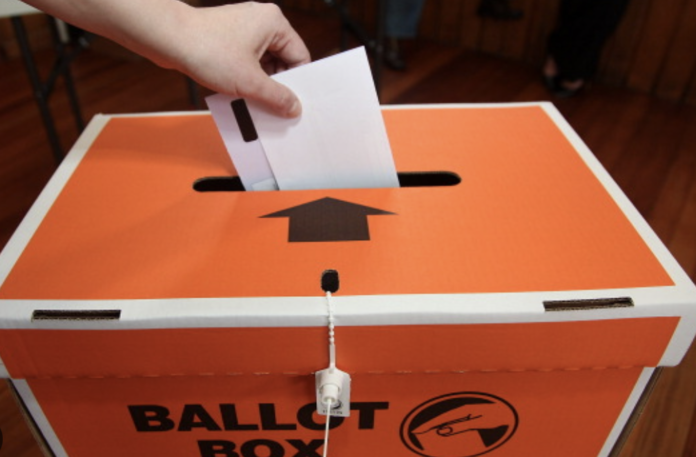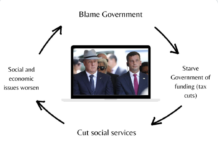Democracy in New Zealand could and should be improved in so many ways. So it’s a pity that the Government has yet again produced a review of elections that has delivered a disparate and incomplete package of recommendations. Few of the recommendations will ever see the light of day and, if they do, those chosen will favour the vested interests of whoever is in government at the time.
The interim report of the Labour Government’s He Arotake Pōtitanga Motuhake – Independent Electoral Review has just been published, and as an overall package it’s unconvincing. There are plenty of individual proposals that on their own might improve politics, but the whole project is unlikely to lead to the sort of sweeping reform that the panel are suggesting.
Reforms for the vested interests of politicians
The headline recommendations of the report from the panel are about lowering the voting age, holding a referendum to shift to a four-year parliamentary term, giving all prisoners the right to vote, decreasing the MMP threshold to 3.5%, abolishing the “coat-tail” rule, and capping donations that people can make to politicians. Some of these would make New Zealand more democratic, while others would make the country less so.
For example, getting rid of the one electorate “coat-tail” rule will be good for parties like Labour and National – and might generally be populist – but will reduce the representation of minor parties, leading to a less representative parliament. Parties that win an electorate seat and get, say, three per cent of the vote, would no longer be proportionally represented in Parliament. In the current Parliament, for example, Te Pāti Māori would be denied its second seat.
But the problem is that the panel’s package is something of a pick-and-mix selection for politicians to choose between. A scattergun approach has been taken – with tinkering here and there, but nothing comprehensive.
Most of the recommendations will appeal more to the Green and Labour politicians’ interests. And already there have been criticisms that the reforms appear designed for the interests of those parties currently in power. This is unfortunate. In dealing with major changes to how the rules of elections are run, the process needs to be one that works on a level playing field rather than just handing more power to whoever is in charge.
A Wasted opportunity for reform
The latest review has been sold to the public as a “once in a lifetime” chance to overhaul elections and the creaking old Electoral Act. However, it’s turned out to be quite the opposite – a piecemeal process, which mostly just rehashes the flawed review carried out in 2012 by the Electoral Commission, which was also toothless and lightweight.
The current review could have been so much more useful if it had concentrated on just political finance – fixing up the very serious problems of money in politics. This was actually the main justification for the review, and yet on the question of political fundraising it ends up being very much “once over lightly” instead of dealing with the problem systematically and in-depth.
For example, although one of the biggest current issues in political funding is the propensity for politicians to run “Cash for access” schemes in which Cabinet ministers and the like charge for meetings with wealthy businesspeople, this has been ignored by the report – as has a lot of other dodgy fundraising that has led to scandals, Serious Fraud Office charges, and court cases.
The panel has come up with novel recommendations for dealing with donations and state funding of parties, and these now need some serious discussion. But unfortunately, the panel has hardly scratched the surface, and proposed various recommendations that may not work in practice.
Similarly, the panel could have focused on constitutional reforms, a review of the MMP electoral system, or even just electoral administration. Instead, the panel has dipped into some areas, left others alone, and all without any discernible pattern or logic. The result is that each recommendation sits on its own, is seemingly superficial, and is unrelated to the other recommendations.
This isn’t exactly the fault of the panellists that the Government handpicked for the role. This was a panel set up by former Justice Minister Kris Faafoi before he gave up the portfolio and became a lobbyist. Unfortunately, he didn’t do his homework when he set up the review, which led to a botched terms of reference that directed his panel on what they should and shouldn’t look at.
Any attempt to design a process to build consensus and broad support for changes to democracy has been thrown out in favour of a process that is likely to treat electoral rules like a political football.
The review could have been a significant and in-depth opportunity to look at every aspect of the electoral system, or even just one aspect like political donations, and to consider all sorts of radical or fresh ideas that might improve the way our elections translate the popular will of the people into parliamentary representation.
More debate is required and less partisan manoeuvring
Despite the shortcomings of how the whole exercise has been set up and what they have come up with, all of the recommendations do deserve much more debate and serious consideration. So far, the public reaction to the interim reactions has been rather muted, which suggests the conversation is already ended before it’s begun.
On the one hand, the Greens have strongly endorsed the recommendations, and on the other hand Act has declared the recommendations to be essentially partisan attempts “produced by left-wing activists trying to screw the scrum”.
What’s more, the Prime Minister has now said that the Labour Party will essentially cherry-pick from the interim review, and put forward its own solutions on electoral reform at the election, pre-empting its own panel’s final report which is due a month after the election.
This brings the whole process into question, making it look like a waste of everyone’s time. Once more the public could be forgiven for feeling that the process is just another one of Faafoi’s botched attempts at reform that won’t go anywhere but is designed to make it look like the Government is delivering something when they’re not.
Referendums on the electoral system
The one recommendation that all the politicians agree upon from the report is reducing elections to every four years instead of three. Of course, this is to be expected – the politicians have a very strong vested interest in having their job performance reviewed much less often. This simply amounts to having less democracy.
So, if there is one recommendation that the review panel might easily get across the line it’s the idea of having a referendum on the length of the parliamentary term.
But maybe other areas should also be taken to a referendum. The most interesting one would be on what amount of donation should be allowed from any one individual over a term of Parliament.
The panel has recommended individuals should be allowed to give up to $30,000. Of course, there are not many people who could afford to give away anywhere near that amount. And it’s curious as to why the panel think that this exact amount should be allowed.
Recent survey evidence commissioned by the Victoria University of Wellington shows that about two-thirds of people want donations above $10,000 to be made illegal, and almost half of the public would outlaw donations above $1000. Hence, if a referendum was held on the topic, then surely a much lower figure than $30,000 would be agreed upon.
All of this serves as a reminder that in designing the rules of our democracy, we should be wary of listening too much to either the loudest voices or the vested interests of the politicians themselves. It’s time now for the public to have their say – you can read the report and make a submission here: He Arotake Pōtitanga Motuhake – Independent Electoral Review.





…and how about those non-citizen voters, eh? Seems like a very unique feature of the NZ electoral system, and yet none of the “experts” will touch it. The longer it goes on before the general public and filthy underclass find out just how many foreign voters there are, the bigger the fucking mess will be. Bloody, too.
how many of them are there castro? do they actually vote…verifilable figures please
what do you mean by non citizens?
Report, recommendations, & reform heading straight for the bin. More waste, thanks Labour.
Just another Labour initiated working group set up (what’s that now, the 500th – 600th one in 6 years) to show they are ‘doing something’ or ‘taking the matter seriously’ only to ignore the findings of the working group as the initial political headlines and concerns leading to the working group set up have blown over and forgotten about so the recommendations can be ignored as the public have moved on.
Labour have had 6yrs of this bullshit working group nonsense, someone must have told Ardern it was a good way to bury political bad news and looks as if she is doing something….she didn’t realise it was supposed to be used sparingly, then she realised it seemed to work well and be a convenient get out of jail card when media/opposition MPs asked awkward questions! And lo and behold… before you know it hundreds and hundreds of ‘working groups’ set up…funny that eh?
Good summary of a bunch of populist ideas that do not help our democracy in the slightest but instead pander to the Greens and Labour. We don’t need more politicians. We don’t need votes for juveniles. We do need corruption free politics. That’s all.
Yes indeed.
And elections free of corrupt ideas.
Promising to build 100,000 new house in 10 years and then fail to deliver, not a good look.
Increase the police force by 1800 officers and then create no material benefit. Not a good look…..
If one looks at the outcome of the review one could argue that Kris F did his homework very well.
Excellent article Bryce.
Good summary, Bryce. Sadly politicians seem even more self serving than ever. Corruption is a big problem, and you would think that the Trump scandal as well as all the terrible things going on in NZ donations, would promote tighter controls on money and donations, but nope. Who cares, they just want more power and more committees without worrying about voters too much.
The present democratic system is not what we envisage democracy to be about, and doesn’t help us to reach the vision of it which should be our goal. The system actually is like our thinking at Christmas, of presents and giving the kids/populace what Santa thinks they want or should have. There is a little of asking the kids what they would like and a lot of giving them whatever is the current desire or meme.
We citizens aren’t having to work for democracy and are just touching the appearance of it; living in a myth. That is why our nation is being degraded and dismantled while we watch. We think that Santa knows best. We need to meet regularly, locally as citizens, and discuss in an organised way, with notes,what is happening around us and nationally, learn and discuss as to what is needed, look at what can be afforded, and question our direction and future. Then take the next step seek to amend matters that don’t add up after nation- wide meetings and referenda among those who have registered and attended the meetings regularly and rationally. No easy-riders and dreamers, idealistic with no practical understanding of humanity and nature. Time consuming yes, but only people passionate about a working democracy need apply to be voting citizens.
What would be good about electoral and political reform now would be for the PTB to listen to demands, and discuss with the nation the viability of doing them and which are, as some Nat once referred to, ‘nice wants’ not needs. These would be what the citizens generally, saw as needs however. Then prioritise action and the areas most in need to lift a living standard and business facilitating, plus areas that are main earners for the country’s coffers and facilitate their reasonable requirements. Do what the people want, within reason.
That would advance democracy and lead to a more effective economic and practical polity.
But don’t do that gummint and advisors and paid flunkeys, it is much more dramatic to have people on edge, beside themselves with fury, over the mismanagement by the PTB as they go forward in ways that line their own pockets, advance their own interests. The furore sells newspapers and continues the theme of ‘disruption’ that is meant to herald a new dawn in advanced intelligent existence! Go forward and prosper those who are complacent and have the wiles, meanwhile those who don’t have the wiles or the means to break out, find that ‘mean’ has many meanings and find the most grotesque one applies to them.